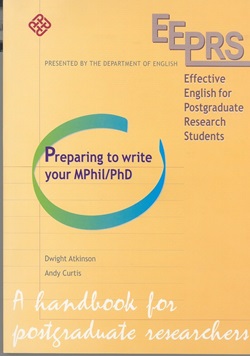- Provide EAP (English for Academic Purposes) support to PolyU postgraduate research students
- Raise awareness of the existence of this new programme through a variety of different means
- Develop an extensive series of workshops designed to improve research students’ English skills
- Provide individual, face-to-face mentoring to develop research students' writing skills
- Embark on niche areas in EAP research for postgraduate students
- Embark on research studies based on data collected and analyzed from the programme
Programme Coordinator
Dr. Scott Daly
FG330
+852 2766 7644
scott.daly@polyu.edu.hk
Clerical Support
Ms Zoe Mak
AG428
+852 3400 3497
egeeprs@polyu.edu.hk
As well as offering workshops aimed at improving the English skills of RPg students, EEPRS offers the course ENGL6016: Advanced Academic English for Research Students: Publishing and Presenting. Click here for details.
PolyU postgraduate research students are invited to submit to us parts of their written work for advice, from one of the EEPRS team members.
Work submitted by students will first be read by us, then there will be a face-to-face, one-to-one session with the research student and the EEPRS team member. In the session, the students will be helped to develop their writing skills, through an increased awareness of their own writing strengths and weaknesses.
We recommend that students start taking advantage of this service at the beginning of their writing process so that areas needing improvement could be identified as early as possible.
As our aim is to improve the writer, not just the writing, requests to proofread chapters or the complete thesis will be declined.
General guidelines:
- Dissertation Chapters / Students' Research Papers based on Dissertation
- Each one-hour session covers around 10 pages. Currently, each student may book up to 2 hours / 20 pages.
- Font size: 12 points
- Spacing: Double-line spacing
Here are some comments from students who have been to EEPRS mentoring sessions:
- "clearly provides alternative of words and suggests the ways to rewrite the sentences"
- "This service is very helpful to understand some viewpoints and requirements of the reader. It can improve the flow of my thesis. I will highly recommend this service to other students."
- "wholeheartedly concerned by the mentor on my writing"
- "I found the mentor nice and helpful"
- "the discussion session is useful that provides a chance for me to discuss with the mentor"
- "gave me some useful general suggestion on how to express ideas clearly in thesis"
Semester two, 2023:
Workshop 2: Corpus resources for academic writing
Facilitator: Dr. Phoenix Lam, Department of English and Communication
Time/date: Wednesday 6thMarch, 2:30–3:30pm
Venue: EF312
Workshop 1: English and academic presentations
Facilitator: Dr Margo Turnbull, Department of English and Communication
Time/date: Thursday 11th January, 2–3pm
Venue: BC303

by Dwight Atkinson & Andy Curtis
This Handbook is designed for postgraduate research students who are required to write either an MPhil thesis or PhD / doctoral dissertation as their main degree requirement. The Handbook is based on the accumulated experience of the EEPRS Programme. The main audience for this Handbook is therefore MPhil and PhD research students. There are, however, other groups that we hope will also find it useful, including supervisors of research students, full-time academic staff completing their own research degrees part-time, and research associates and assistants who need to write for publication, as well as others. You can now download the handbook here:
- Acknowledgements and Dedication
- EEPRS Programme
- Introduction
- Chapter 1 - Getting Started: Managing Your Postgraduate Research Degree
- Chapter 2 - Critical Reading and Critical Thinking
- Chapter 3 - Using the Research Article as a Guide for Theis / Dissertation Writing
- Chapter 4 - From Research Articles to Thesis / Dissertation References
- References
- Want to be added to our mailing list?
- Want to reserve a place for our workshops?
Online registration - Want to let us know what you think about a workshop you've attended?
- Want to meet with one of our team members to discuss your thesis?
- Want to let us know how your mentoring session went?
- Want to tell us what you want us to know?
egeeprs@polyu.edu.hk



